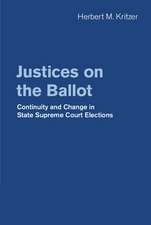Judicial Power and Strategic Communication in Mexico
Autor Jeffrey K. Statonen Limba Engleză Hardback – 21 mar 2010
Preț: 434.98 lei
Preț vechi: 488.74 lei
-11% Nou
Puncte Express: 652
Preț estimativ în valută:
83.23€ • 87.12$ • 69.28£
83.23€ • 87.12$ • 69.28£
Carte tipărită la comandă
Livrare economică 31 martie-14 aprilie
Preluare comenzi: 021 569.72.76
Specificații
ISBN-13: 9780521195218
ISBN-10: 0521195217
Pagini: 236
Ilustrații: 18 b/w illus. 20 tables
Dimensiuni: 160 x 235 x 18 mm
Greutate: 0.46 kg
Editura: Cambridge University Press
Colecția Cambridge University Press
Locul publicării:New York, United States
ISBN-10: 0521195217
Pagini: 236
Ilustrații: 18 b/w illus. 20 tables
Dimensiuni: 160 x 235 x 18 mm
Greutate: 0.46 kg
Editura: Cambridge University Press
Colecția Cambridge University Press
Locul publicării:New York, United States
Cuprins
Part I. Judicial Communication and Judicial Power: 1. Introduction; 2. A model of constitutional review and case promotion; Appendix 2; Part II. The Politics of Constitutional Review in Mexico: 3. Public relations on the Mexican Supreme Court; 4. Decisions, case promotion, and compliance in Mexico; Appendix 4A; Appendix 4B; Part III. Relationships between Transparency and Legitimacy: 5. Constitutional review and the development of judicial legitimacy; Appendix 5; 6. A cross-national analysis of judicial legitimacy; 7. Democracy and the development of judicial power.
Recenzii
'Using novel new data from Mexico, Staton advances our understanding of how courts are able to use information to proactively shape their strategic environment. As the first major study of court-media relations in new democracies, this is a major contribution to the literatures on comparative judicial politics and the role of law in democratization.' Tom Ginsburg, University of Chicago Law School
'Judicial Power and Strategic Communication in Mexico is an outstanding contribution to the growing subfield of comparative judicial politics and shows just how far the strategic revolution in the study of judicial behavior has come. Building on the key insight that public support matters for courts, the book breaks new ground theoretically and empirically by showing how judges seek to build public support endogenously. In so doing, the book provides a compelling novel logic linking judicial power and democracy. Using rigorous formal theory, quantitative analysis of original data, and in-depth case studies, the book will hold enormous appeal for anyone interested in Latin American politics, judicial politics, or comparative political institutions.' Gretchen Helmke, University of Rochester
'Jeffrey K. Staton's Judicial Power and Strategic Communication in Mexico is an important addition to a growing, cross-national literature on constitutional courts. Existing scholarship has highlighted the importance of public support and awareness of judicial power. Staton moves beyond these efforts by demonstrating that judges court public support through media and communications strategies that inform citizens about judicial procedures and decisions. Combining theoretical and empirical rigor, the book has implications that extend far beyond its focus on the Mexican court.' Georg Vanberg, University of North Carolina, Chapel Hill
'Staton makes a strong contribution to recent judicial politics research by pointing out the strategic nature of public communication by constitutional courts … Rich insights can be gained from the in-depth case study of the Mexican Supreme Court during its decisive phase of democratic transition under the Zedillo and Fox administrations … this study offers a most innovative approach and sound empirical evidence on strategic communication presented in a very comprehensive way for any researcher interested in judicial behaviour and the interdependence of political institutions.' Jens Brandenburg, Political Studies Review
'Judicial Power and Strategic Communication in Mexico is an outstanding contribution to the growing subfield of comparative judicial politics and shows just how far the strategic revolution in the study of judicial behavior has come. Building on the key insight that public support matters for courts, the book breaks new ground theoretically and empirically by showing how judges seek to build public support endogenously. In so doing, the book provides a compelling novel logic linking judicial power and democracy. Using rigorous formal theory, quantitative analysis of original data, and in-depth case studies, the book will hold enormous appeal for anyone interested in Latin American politics, judicial politics, or comparative political institutions.' Gretchen Helmke, University of Rochester
'Jeffrey K. Staton's Judicial Power and Strategic Communication in Mexico is an important addition to a growing, cross-national literature on constitutional courts. Existing scholarship has highlighted the importance of public support and awareness of judicial power. Staton moves beyond these efforts by demonstrating that judges court public support through media and communications strategies that inform citizens about judicial procedures and decisions. Combining theoretical and empirical rigor, the book has implications that extend far beyond its focus on the Mexican court.' Georg Vanberg, University of North Carolina, Chapel Hill
'Staton makes a strong contribution to recent judicial politics research by pointing out the strategic nature of public communication by constitutional courts … Rich insights can be gained from the in-depth case study of the Mexican Supreme Court during its decisive phase of democratic transition under the Zedillo and Fox administrations … this study offers a most innovative approach and sound empirical evidence on strategic communication presented in a very comprehensive way for any researcher interested in judicial behaviour and the interdependence of political institutions.' Jens Brandenburg, Political Studies Review
Notă biografică
Descriere
Argues that constitutional courts develop public relations strategies to increase the transparency of judicial behavior and promote judicial legitimacy.



















